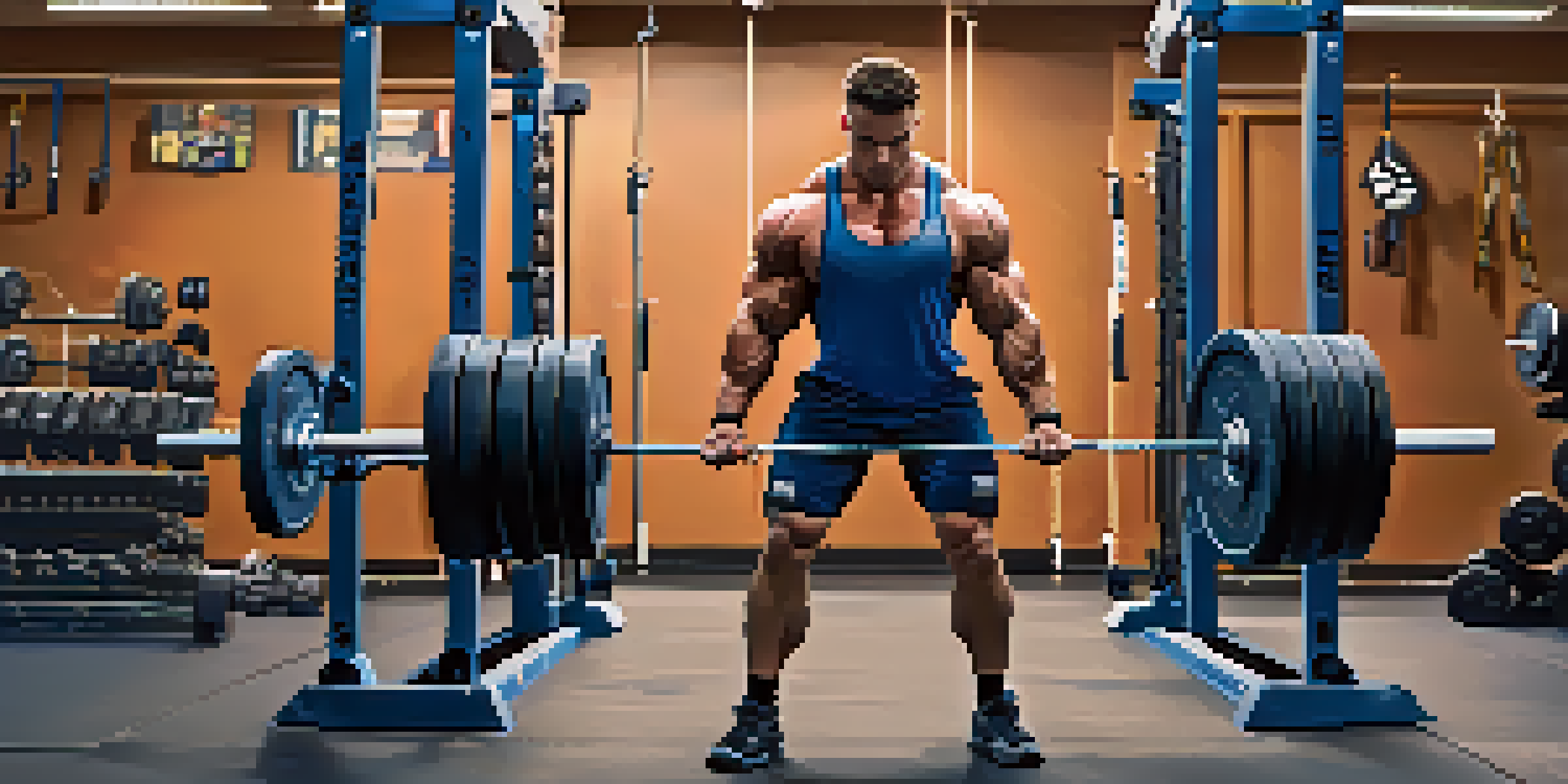Powerlifting and Testosterone: Boosting Levels Naturally

Understanding Testosterone and Its Role in Powerlifting
Testosterone is often hailed as the king of hormones, especially when it comes to strength training. It plays a crucial role in muscle growth, strength development, and overall athletic performance. For powerlifters, higher testosterone levels can mean the difference between lifting heavier weights and plateauing in training.
Strength does not come from physical capacity. It comes from an indomitable will.
In addition to physical benefits, testosterone influences energy levels, mood, and motivation. When you're feeling pumped and ready to conquer the weights, it’s often thanks to this powerhouse hormone. Understanding its importance can help powerlifters appreciate their training and set realistic goals.
Naturally boosting testosterone through powerlifting not only enhances performance but also supports overall health. As lifters strive to break their personal records, they also pave the way for a balanced lifestyle that prioritizes wellness, making the journey rewarding beyond just gains.
How Powerlifting Affects Testosterone Levels
Engaging in high-intensity lifting, as seen in powerlifting, stimulates the production of testosterone. This occurs because heavy resistance training creates a stress response in the body, prompting it to release hormones that promote muscle repair and growth. Essentially, the heavier you lift, the more your body works to adapt, which can lead to increased testosterone levels.

Research indicates that compound movements, such as squats and deadlifts, are particularly effective in boosting testosterone. These exercises engage multiple muscle groups, resulting in a greater hormonal response compared to isolation exercises. So, if you want to maximize your testosterone boost, focus on those big lifts.
Testosterone Boosts Powerlifting Gains
Higher testosterone levels significantly enhance muscle growth and overall athletic performance for powerlifters.
Additionally, the frequency and volume of your training sessions can impact testosterone levels. Striking a balance between challenging workouts and adequate recovery is key. Overtraining can lead to decreased testosterone, highlighting the importance of listening to your body and allowing for recovery time.
Nutrition's Role in Boosting Testosterone Levels
What you eat plays a significant role in your testosterone production. A balanced diet rich in healthy fats, proteins, and carbohydrates provides the necessary nutrients for hormone synthesis. Foods such as avocados, nuts, and lean meats can support testosterone levels and overall performance in powerlifting.
The only way to prove you are a good sport is to lose.
Micronutrients like zinc and vitamin D are also essential for maintaining healthy testosterone levels. Incorporating foods like spinach, pumpkin seeds, and fatty fish can help ensure you're getting these vital nutrients. A well-rounded diet not only supports your lifts but also contributes to your overall health and well-being.
Lastly, hydration shouldn't be overlooked. Drinking enough water is crucial, as even mild dehydration can negatively impact performance and hormone levels. So, raise your water bottle and keep sipping to support your powerlifting journey and testosterone levels.
The Importance of Sleep for Testosterone Production
Sleep is often the unsung hero in the quest for higher testosterone levels. Quality sleep allows your body to recover and repair, and it's during deep sleep that testosterone is primarily produced. Prioritizing good sleep hygiene can, therefore, be a game changer for powerlifters looking to maximize their performance.
Studies show that individuals who consistently get less than seven hours of sleep per night tend to have lower testosterone levels. This highlights the importance of establishing a regular sleep schedule and creating a restful environment. Small changes, like reducing screen time before bed and keeping your room dark, can lead to better sleep quality.
Nutrition Supports Testosterone Levels
A balanced diet rich in healthy fats, proteins, and essential micronutrients is crucial for maintaining optimal testosterone production.
Ultimately, the link between sleep and testosterone is clear. By ensuring you get enough restorative rest, you support your body's natural processes, which can lead to improved strength gains and overall performance in powerlifting.
Managing Stress for Optimal Testosterone Levels
Stress can be a double-edged sword when it comes to testosterone. While some stress, like the challenge of lifting heavy weights, can be beneficial, chronic stress can lead to elevated cortisol levels, which negatively impact testosterone production. Therefore, managing stress is crucial for powerlifters aiming to maintain their hormone health.
Incorporating relaxation techniques such as meditation, yoga, or deep breathing exercises can help mitigate stress. These practices not only promote mental well-being but also create a more favorable hormonal environment for testosterone production. It’s about finding balance and ensuring that stress doesn’t hinder your progress.
Additionally, recognizing your stress triggers is essential. Whether it’s work, relationships, or training pressures, identifying these factors allows you to develop coping strategies. By addressing stress proactively, you can keep your testosterone levels in check and stay focused on your lifting goals.
Supplementation: The Pros and Cons
While natural methods are often the best approach for boosting testosterone, some lifters may consider supplements. Products like zinc, vitamin D, and D-aspartic acid have been shown to support testosterone production in individuals with deficiencies. However, it’s crucial to do your research and consult with a healthcare professional before starting any supplement regimen.
Many supplements claim to boost testosterone, but not all are backed by solid research. It’s essential to differentiate between effective supplements and those that may only offer empty promises. Focusing on a healthy diet, lifestyle changes, and consistent training should always come first.
Sleep and Stress Impact Hormones
Quality sleep and effective stress management are vital for supporting testosterone production and improving powerlifting performance.
If you do choose to incorporate supplements, do so as a complement to your existing routine, not a replacement. Remember, there’s no magic pill for gains. A well-rounded approach that includes proper nutrition, sleep, stress management, and powerlifting will yield the best results in boosting testosterone levels.
Creating a Holistic Approach to Boosting Testosterone
Boosting testosterone levels naturally requires a multifaceted approach. It’s not just about lifting heavy weights; it’s about creating a lifestyle that promotes overall health and well-being. By incorporating strength training, proper nutrition, quality sleep, and stress management, you lay the groundwork for optimal hormone levels.
Regularly evaluating your training routine and lifestyle choices is essential. Are you allowing enough recovery time? Is your diet supporting your goals? Reflecting on these aspects can help you make necessary adjustments to keep improving your testosterone levels and powerlifting performance.

Ultimately, the journey to enhancing testosterone levels naturally is about consistency and balance. By adopting a holistic approach, powerlifters can enjoy the benefits of increased strength, better recovery, and improved overall health—making the hard work in the gym truly rewarding.